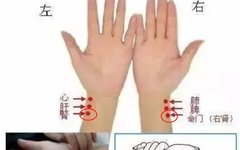Source: Deep Understanding
Today, Feng Ge has summarized how to distinguish between Kidney Yin Deficiency and Kidney Yang Deficiency in half a day. A reliable pulse diagnosis method is attached at the end, hoping it will be useful for you.
First, we must understand: Traditional Chinese Medicine (TCM) emphasizes syndrome differentiation and treatment based on symptoms. To tonify the kidneys, it is essential to distinguish between Yin and Yang. Misusing tonics without understanding whether it is Yin or Yang deficiency can not only be unhelpful but may also cause harm to health.
TCM categorizes kidney deficiency into four types: Kidney Yang Deficiency, Kidney Yin Deficiency, Kidney Qi Deficiency, and Both Kidney Yin and Yang Deficiencies.
1. Kidney Yang Deficiency (commonly known as decline of Mingmen Fire):
Yang deficiency leads to cold; Kidney Yang Deficiency presents more cold symptoms than Kidney Qi Deficiency. Functional decline = Qi deficiency; Functional decline + cold symptoms = Yang deficiency.
Yang deficiency and Qi deficiency exhibit some similar symptoms, but Kidney Yang Deficiency is characterized by increased sensitivity to cold, soreness and coldness in the lower back and knees, etc. Especially, the area below the waist feels cold, requiring more clothing than others, frequent urination at night, fatigue, impotence, edema, clear and prolonged urination, incontinence or difficulty urinating, pale tongue, etc., indicating internal cold due to Yang deficiency. At night, the abdomen and calves feel cold, and even in summer, one needs to cover with a blanket. In winter, even with thick blankets, one still feels cold, and consuming cold foods can easily lead to diarrhea.
After diagnosis, suitable foods for those with Kidney Yang Deficiency include seafood and chive seeds. Tonics can include Jin Gui Shen Qi Wan (Jin Gui Kidney Qi Pill), Gui Fu Di Huang Wan (Cinnamon and Rehmannia Pill), You Gui Wan (Right Return Pill), and Wu Zi Yan Zong Wan (Five-Seed Pill), as well as the compound Xiong E Yi Yang Jiao Nang (Oral Liquid), which is a classic formula for warming and tonifying Kidney Yang.
2. Kidney Yin Deficiency (commonly known as insufficient Kidney Water):
In simple terms, Yin deficiency leads to heat. Why? Because Yin deficiency results in reduced fluids, which cannot contain Yang, and the basic characteristic is heat. Typical symptoms include low fever, tidal fever, five hearts heat (palms and soles), flushed cheeks, night sweats, dry mouth, short urination, dry stools, red tongue with little coating, etc. In addition to the common manifestations of Yin deficiency, Kidney Yin Deficiency also presents with soreness and weakness in the lower back and knees, tinnitus, and easy sweating during sleep, stopping upon waking, irritability, and heat in the palms and soles.
In cases of Kidney Yin Deficiency, fire can easily become旺 (旺 means to flourish or become vigorous), and if warming and Yang-boosting herbs are used at this time, it is like adding fuel to the fire, exacerbating the patient’s heat symptoms. At this time, it is most suitable to take nourishing Kidney Yin formulas: Liu Wei Di Huang Wan (Six-Ingredient Rehmannia Pill), Zuo Gui Wan (Left Return Pill); for Yin deficiency with excess fire, use Zhi Bai Di Huang Wan (Anemarrhena and Phellodendron Pill), for Liver and Kidney Yin deficiency, use Qi Ju Di Huang Wan (Lycium and Chrysanthemum Pill), and for Lung and Kidney Yin deficiency, use Mai Wei Di Huang Wan (Ophiopogon and Rehmannia Pill).
3. Kidney Qi Deficiency:
Qi deficiency, in simple terms, can be understood as insufficient energy and reduced function. The external manifestation is fatigue, lack of energy, and a tendency to speak less. Another obvious manifestation is shallow breathing, with more exhalation than inhalation, and shortness of breath upon exertion, known as Kidney not receiving Qi. Poor sleep quality, frequent nighttime urination, and urgency in urination are also common.
Finally, patients with Kidney Qi Deficiency also show insufficient ability to hold and transform fluids, such as clear and prolonged urination, large volume, nocturia, enuresis, incontinence, or residual dribbling (leaving drops after urination). Males may experience premature ejaculation, nocturnal emissions, and females may have prolonged clear and thin vaginal discharge, which are also manifestations of Kidney Qi Deficiency. Severe cases may present with edema. The tonic for Kidney Qi deficiency is Jin Gui Shen Qi Wan.
4. Both Kidney Yin and Yang Deficiencies: present with symptoms such as five hearts heat, night sweats or spontaneous sweating, cold limbs, nocturnal emissions, insomnia, vivid dreams, red tongue without coating, thin and rapid pulse, or pale tongue with white coating, deep and slow pulse.
For both Yin and Yang deficiencies, it is recommended to use the mild tonifying Kidney formula, Jin Gui Shen Qi Wan. Jin Gui Shen Qi Wan can tonify Yin deficiency and assist Yang weakness, hence the saying that it tonifies both Yin and Yang.
Below, I share a reliable diagnostic method for Kidney Yang Deficiency and Kidney Yin Deficiency—the Shen Mai Method. That is: palpate your radial pulse, pressing down firmly. When the radial pulse is pressed, there will be two changes: (1) A person with sufficient Kidney Qi will have a distinct pulse sensation. (2) A person with insufficient Kidney Qi will feel the radial pulse not beating. If the left Kidney pulse is weak: it indicates Yin deficiency. If the right Kidney pulse is weak: it indicates Yang deficiency.
Feng Ge reminds again: It is essential to first differentiate the syndrome, then treat based on the symptoms. Clarifying whether it is Kidney Yin Deficiency or Kidney Yang Deficiency is key. If you are unsure in your judgment, be sure to consult a professional physician at the hospital. Tonics should not be taken indiscriminately, and Kidney tonification should not be done recklessly.
Click “Read Original” to see more content.

